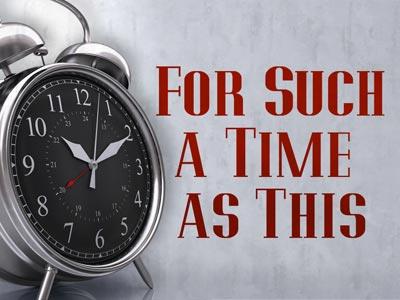-
Queen Esther Sermon I: In The Right Place At The Right Time Series
Contributed by Charles Cunningham on Feb 20, 2023 (message contributor)
Summary: In times of turmoil, women of inner strength rise to the challenge of making their world a better place in which to live by devoting themselves to righteous causes that build moral character and promote peace and good will.
QUEEN ESTHER: A WOMAN OF INNER STRENGTH AND COURAGE
IN THE RIGHT PLACE AT THE RIGHT TIME AFTER BEING IN THE WRONG PLACE AT THE WRONG TIME
As a woman of inner strength and courage, she admonished young ladies and gentlemen to make three special choices in life: Believe in a worthy cause that is larger than yourself . . . Make life an experience of joy despite heartaches . . . Cherish human connections with family, friends and others, despite differences.
Who was she? Barbara Bush, wife of the 41st, mother of the 43rd president of the United States, celebrated this past week after her passing at the age of 92.
Another woman of inner strength and courage appeared in the headlines this week when a Southwest Airlines passenger jet was forced into an emergency landing after one of the two engines exploded in flight, causing the death of one passenger and endangering the lives of the other 143 passengers.
Hailed as a heroine, Pilot Tammie Jo Shults is said to have displayed “nerves of steel” as she calmly landed the crippled aircraft safely, even though she had to do so with the plane perilously tilted at a 40-degree angle.
Both women, in a sense like Esther in the Bible, were in the right place at the right time in a topsy-turvy world in which unusual and unreal demands are placed upon folks who have found themselves in situations to which they must adjust or else suffer dire consequences.
Why even bother studying the Book of Esther? There is no mention of the name of the Lord God, nor is there any significant reference to anything religious in the book, except the nationality of the two main characters.
Yet the scroll containing the story of Mordecai and Esther was included in the canon of Holy Writ . . . a Jewish Holiday (Feast of Purim) celebrating the success of the heroine of the story is observed to this day by orthodox Jews . . . of similar writings that superseded the story of Esther in the annals of Jewish literature, this one about Esther is said to be “dearest to the hearts” of rank and file Jews.
Most of us love stories of intrigue that tell how folks of humble beginnings overcame obstacles set before them to go on to achieve amazing or heroic feats. After all, as we Christians like to say, “God is in the business of turning negatives into positives” - and so should we.
Thus, the story of Esther captures the hearts of folks who, like this Jewish woman of strength and courage, long to be a part of making this world a better place by believing in a cause larger than oneself, righting wrongs, thwarting evil schemes, relating redemptively to others, administering justice for all.
Christians connect to Esther not only because of her Jewish upbringing, but also, her character, ideals, unselfish devotion to right versus wrong, strong inner resolve, courage to place the best interests of others above personal interests – all of which, taken together, speaks volumes about God’s providential care for the “sheep of His pasture” . . . His covenant people – which is to say, as Paul put it:
God works in and through all situations involving those who are His children (who love Him) to bring about “good” - that which is best - for them and for others who come after them. And, don’t you know, the world has yet to see what God can and will do through one person wholly committed to Him and His purpose.
So, let’s see what the Lord God of Israel did (working in the background) in and through two devoted Jewish people (connected to Christians by virtue of theological fact - that Judaism cradled Christianity) who got caught up in an extremely disdainful as well as dangerous scheme concocted by evil doers – Esther 2:5-18. . .
Well, well, well. After reading this part of the story about how Mordecai’s cousin Hadassah was renamed Esther and crowned Queen, one wonders if the author made no mention of the name of the Lord due to the salacious beginning of the story and therefore a story he thought unworthy of having the name of the Lord connected to it. Who knows?
On the other hand, the story serves to remind us that God often chooses the most unlikely people to do amazing things in His kingdom. Yes! The Lord our God “positions” His chosen servants (whoever or wherever they are) to influence decisions that lead to actions that result in outcomes for good rather than evil.
Perhaps you yourself have gotten caught up in the “messiness” of a certain situation not of your making . . . only to realize after the fact that your demeanor, deportment, dependence on a power higher than yourself had served to get the attention of someone who “used” you for selfish reasons . . . then it occurs to you that God allowed it so that you could be “used” as His instrument for overcoming evil with good . . . righting wrongs . . . bringing about peace and good will.

 Sermon Central
Sermon Central



